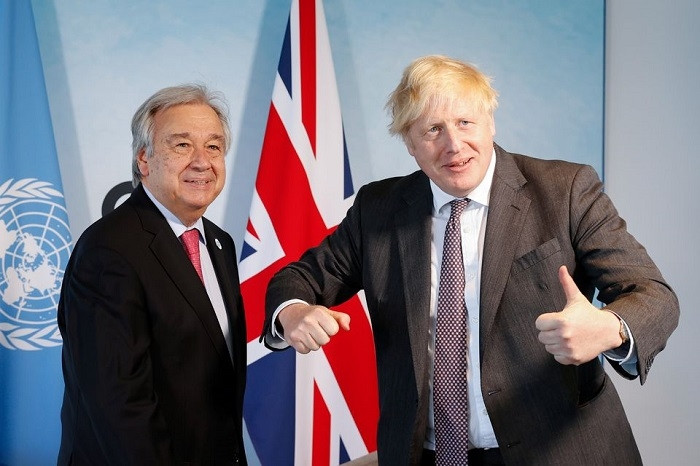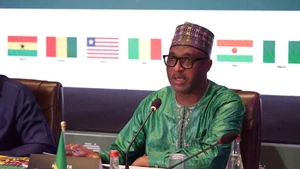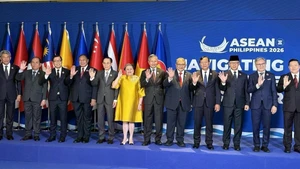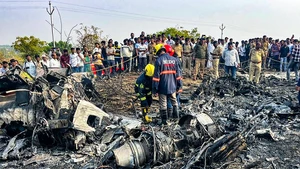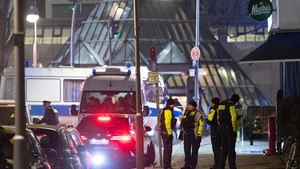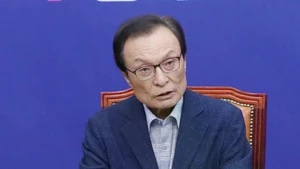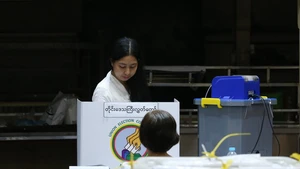Johnson and U.N. Secretary-General António Guterres hosted a roundtable of world leaders on Monday to address major gaps on emissions targets and climate finance.
"Too many major economies – some represented here today, some absent - are lagging too far behind," Johnson said. "I’ll stress that again - for this to be a success we need developed countries to find that US$100 billion."
The closed-door meeting during the annual high-level week of the U.N. General Assembly includes leaders and representatives from a few dozen countries representing industrialized nations, emerging economies and vulnerable developing countries.
Those involved in the roundtable included the United States, China, India, EU nations as well as Costa Rica, the Maldives and a mix of developing and middle income countries and industrialized nations.
Johnson told reporters that he is hopeful the United States can deliver on a promise to step up its share of money toward the US$100 billion annual goal but "we've been here before" and "we're not counting our chickens."
U.S. Climate Envoy John Kerry, who represented the United States at Monday's meeting, said Washington would deliver more climate aid ahead of the Oct. 31-Nov. 12 COP26 Climate Change Conference in Glasgow, Scotland.
"The United States is crucially important," Johnson said. "It will send a massively powerful signal to the world."
Guterres told reporters after the roundtable that he heard "encouraging declarations" about raising financial support to help developing countries deal with climate change.
One U.N. official described the discussions as "brutally honest" about expectations for the summit and that there "was a collective sense of ‘we're in trouble'."
OFF TRACK
The roundtable discussion aimed to ensure a successful outcome at the conference even as reports show major economies being far off track on their emission reduction goals and climate finance commitments.
A U.N. analysis of country pledges under the Paris agreement on climate released on Friday showed global emissions would be 16% higher in 2030 than they were in 2010 - far off the 45% reduction by 2030 that scientists say is needed to stave off disastrous climate change.
Another report released on Friday by the Organisation for Economic Co-operation and Development said that rich countries likely missed a goal to contribute US$100 billion last year to helping developing nations deal with climate change after increasing funding by less than 2% in 2019.
Guterres also pressed donor countries and multilateral development banks to show progress toward meeting his goal to increase the share of finance dedicated to helping countries adapt to climate change to 50% from the current level of 21%, said Selwin Hart, special adviser to Guterres on climate action.
A report released on Monday by Oxfam estimated that wealthy governments will continue to miss the US$100 billion goal and reach only US$93 billion to US$95 billion per year by 2025 - five years after the goal should have been met, depriving climate-vulnerable countries of between $68 billion and US$75 billion in total over the six-year target period.
Simon Stiell, Grenada's minister for climate resilience, said that in the weeks between now and the summit, the pressure is on the G20 group of the world's biggest economies to step up their domestic emission reduction targets and commitments to mobilize international climate aid.
"If you look a the role that the G20 plays in the global discussion, they generate 80% of global emissions and constitute 85% of global GDP. They have the wealth and technology to act," he said.
Action by the G20 countries can "move the needle" in terms of meeting the goals of the Paris climate agreement, Stiell said.
Guterres told Reuters in an interview last week that the gulf between developing and developed countries puts the summit at risk of failure.
"There is still a level of mistrust, between north and south, developed and developing countries, that needs to be overcome," Guterres said.
